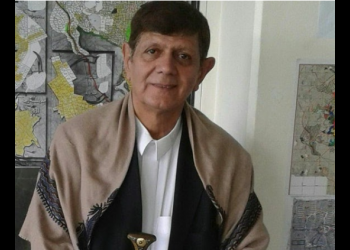Arabic Translation: Here
GENEVA—23 February 2020—
Twenty-four members of the Baha’i community in Yemen are due in a Houthi courtroom on 25 February, in Sana’a, for the latest session of a religiously-motivated sham trial which the Baha’i International Community believes is at least partly a result of directives from Iranian authorities.
A Yemeni Baha’i among those due to be tried—who was also previously arrested, and has asked for his name to be withheld—told the Baha’i International Community that the Houthi authorities have tried to systematically “eradicate the Baha’i community” from the country. “It’s not just targeting a few people,” he added. The Houthis also wanted other Baha’is to “feel afraid.” The Yemeni also said that such persecution harms not only those arrested or jailed but also their families and dozens of other lives.
The Yemeni Baha’i added that his Houthi interrogators had confirmed his arrest was due to his religious beliefs—and because the Baha’is were promoting peace during a time of war. He and other jailed Baha’is were also harassed by extremist individuals in prison who called them “infidels” and threatened them with death.
The trial of the 24 members of the Baha’i community on Tuesday follows years of arbitrary and violent detention of six Baha’is by the Houthi authorities.
Mr. Waleed Ayyash—one of five Baha’is arrested in 2017—was physically tortured while in seven-month solitary confinement in the National Security Bureau. He was also physically forced to affix a fingerprint stamp to a written statement under his name. Mr. Ayyash has insisted that this statement is false.
Four others of the jailed Baha’is—Mr. Kayvan Ghaderi, Mr. Wael al-Arieghie, Mr. Badiullah Sana’i and Mr. Akram Ayyash—have been barred from seeing their lawyers and have been physically mistreated and denied access to medical care.
“The Baha’is that are held in Sana’a are innocent and the physical and mental torture they are experiencing is designed to force them to admit to crimes they have not committed,” says Bani Dugal, Principal Representative of the Baha’i International Community. “Moreover, the Houthis must cease the financial extortion they are inflicting on the Yemeni Baha’is by confiscating and attempting to seize properties belonging to all of the accused as a result of the trial.”
The first Yemeni Baha’i to be arrested after the 2011 revolution was Mr. Hamed bin Haydara. He was detained in 2013, beaten and electrocuted, forced to sign documents while blindfolded, accused of being a “destroyer of Islam and religion” and of being a spy for Israel. Mr. Haydara’s case continued for several years and on 2 January 2018 he was sentenced to public execution for his religious beliefs. Appeals were filed and are currently under review. Since his arrest, 18 appeals court hearings have been held. Mr. Haydara’s next hearing is set to take place on 31 March.
“If the Houthis are to fully commit to the process underway that will bring the peace that is so desperately needed by the people of Yemen, they must respect freedom of religion and belief,” said Diane Ala’i, Representative of the Baha’i International Community in Geneva.
The Baha’i International Community calls on the Houthi authorities to respect the rights of the six detained Baha’is, to grant them access to their lawyers, to release the Baha’is immediately and to cease to persecute the members of this faith in Yemen.







No hay comentarios.:
Publicar un comentario